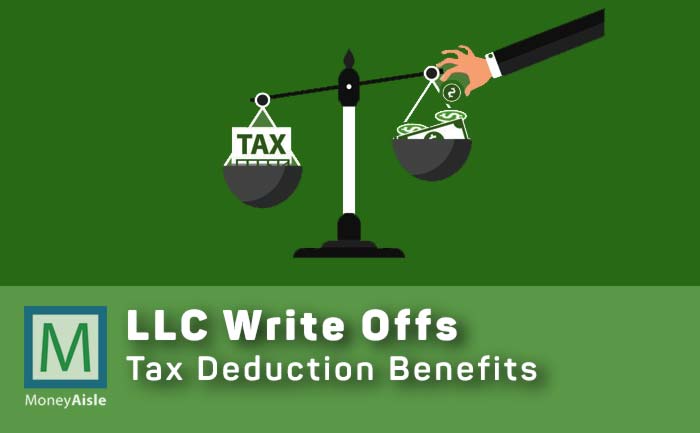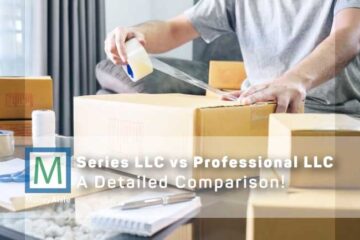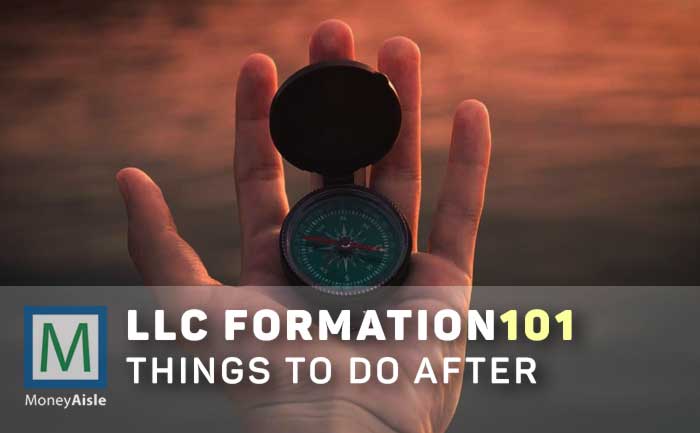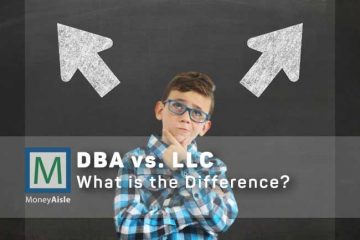To reduce your income tax bills, it is essential that you write off all the business expenses on your taxes. Like other small businesses, Limited Liability Companies (LLCs) can write off certain business expenses that fit the IRS criteria. Let’s have a look at how tax deduction (Tax Write Offs) works.
Important: If you haven’t registered your business as an LLC, you can see our detailed guide on how to form an LLC with simple to understand steps, or you can hire a reliable formation company to do everything for you.
What is a Tax Deduction or Write Off
Business expenses that the Internal Revenue Service allows to be deducted from your taxable income are called Tax Deduction or Tax Write Off. Tax Deductions will enable you to pay a smaller tax bill. You subtract the business expenses from the total taxable income; hence you pay a smaller tax amount.
How LLC Tax Write Off Help Save Money
For instance, you are operating your LLC in California, and your taxable income is $72,000. At this income, you have to pay a total tax of $19,201.89 as follows:
- Franchise Tax: $800
- Medicare: $1,928
- State Income Tax: $2,912
- Federal Income Tax: $5,316
- Social Security: $8,245
However, if you had certain business expenses, a total of $12,000 during that fiscal year, you can subtract this amount from the total taxable income. After the subtraction, your taxable income will be 60,000. On this income, you have to pay a total tax of $15,200.77 as follows:
- Franchise Tax: $800
- Medicare: $1,607
- State Income Tax: $1,974
- Federal Income Tax: $3,949
- Social Security: $6,871
So this is how you can save $4,001.12 after the tax write-off. Saving this much is a big achievement, and you can use this saving to upgrade your mobile, for recreation, or shopping, etc. In the subsequent sections, you will find a comprehensive list of tax deductions that small businesses can avail.
Why is Bookkeeping Essential for Effective Tax Deduction?
Since you have been spending all year round while the tax deduction is an annual process, trying to piece things together at the end of the year would be difficult.
You may not have remembered much of these expenses or mixed up the amounts spent on different things. This means you do not have exact data or records to apply for the tax deduction, and the IRS would reject such appeals while scrutinizing your papers.
To save yourself from such a situation, you need efficient bookkeeping. Many business owners manually record their business expenses, while some use bookkeeping software to keep track of their expenses. No matter which method you prefer, you need efficient bookkeeping to claim your tax deduction at the end of the fiscal year.
Top Business LLC Write Offs for Small Businesses
The following are the most common LLC Write Offs (tax deductions) that you should not overlook while totaling your tax write-offs at the end of the financial year. These deductions are claimed on Schedule C or IRS form 1065.
Professional and Legal Fees
You can claim a tax deduction if you have been charged with the following fees purely for your business:
- Lawyers,
- Tax preparers,
- Accountants,
- Bookkeepers,
- Online bookkeeping service
However, if you hire a lawyer to prepare your will, which is purely personal in nature, such expenses are not deductible. Nevertheless, if the will is related to your business, the fee for that section only will be considered for deduction.
Home Office Expenses
Home office expenses write-off applies to those business owners who use a portion of their home as an office. You need to meet the following two requirements to qualify for the home office deduction:
Principal Place of Business
A business owner applying for a home office write-off should use the home office as the principal place of the business. In other words, such business owners must spend most of their time conducting important business activities at the home office.
Regular and Exclusive Use
Business owners applying for the home office tax deduction must use the home office exclusively for business activities. Though you do not need to reserve an entire room for a home office, a desk double the size of your kitchen table would also not work.
At least your home office should have clearly identifiable boundaries, and it should be like an office even if it is the most primitive form of a formal office. This way, you can present proof to the IRS in case your return is subjected to audit.
After meeting the requirements mentioned above, you can deduct your house expenses in two ways:
1. Simple Method
Business owners who use a part of their home as an office can deduct $5 per square foot up to a maximum of 300 square feet of the house area.
2. Standard Method
In this method, business owners track all the expenses of maintaining their home, including utilities, mortgage interest or rent, housekeeping and landscaping service, real estate taxes, homeowners association fees, and repairs.
These expenses are then multiplied by the percentage of the home dedicated for office use. IRS form 8829 is used to apply for the home office tax write-off with your Schedule C.
Promotion and Advertising
Every dollar spent on business advertisement and promotion is deductible unless not used for political lobbying or campaigning. The following are a few common ways for business advertisement and promotion that are deductible:
- Expenses for sending cards to clients
- The cost of sponsoring an event
- Business logo generation fee
- Expenses to manage social media marketing campaigns
- The cost of launching a new website
- The cost of printing business cards or brochures
- Purchasing ad space in print or online media
Bank and Third-Parties Payment Processing Fees
Third-party payment processors such as PayPal that deduct transaction or merchant fees are subjected to write-off as long as you use PayPal for business purposes.
Moreover, if you have a separate business and personal account, then any monthly or annual charges for the credit card, service charges, overdraft fees, transfer fees, etc., are deductible on the business bank account.
Deductible Non Business Taxes
IRS allows the following nonbusiness taxes for the tax write off:
- Income taxes (local, state, and foreign)
- Sales taxes (state and local general)
- Real estate taxes (state and local)
- Property taxes (State and local personal)
Educational Expenses and Business License
Any course, diploma, or workshop that adds value to your business improves your skills and increases your expertise; all such educational costs are fully deductible.
However, you must qualify for the IRS work-related educational expense. Here are some examples of valid business education expenses:
- Workshops to polish your skills and expertise
- Classes to improve skills in your field
- Tuition fee
- Books, lab fees, supplies, and similar items
- cost of research and typing
- Seminars and webinars
- Books tailored to your industry
- Subscriptions to trade or professional publications
- Transportation expenses to and from classes and other education-related travel
Moreover, business license expenses are also tax-deductible. Please note that any educational expenses unrelated to your business or related to a new career don’t qualify as business tax deductions.
Interest
If you use a credit card to cover your business expenses or have taken a loan, the interest paid to your lender or credit card company can be deducted. To qualify for this deduction, you need to meet the following requirements:
- The lender and you both intend for the debt to be repaid.
- You are legally liable for the debt. For instance, to help you start a business, your parents took a second mortgage on their home. Now you are making all the payments on that mortgage, but you are not legally liable for the debt. Your parents who took the loan are legally liable for this payment. In that case, the interest on the loan does not qualify for the write-off.
- There should be a true creditor/debtor relationship between you and the lender of the loan. The accrual method of accounting does not work for tax write-off if the creditor and debtor are related to each other. This means that if the creditor and debtor are family members, they cannot deduct interest until the payment is made.
In case the loan is part business and part personal, the interest needs to be divided between the company and personal parts of the loan.
Freelance and Contract Labor
If your business has utilized the services of freelancers or independent contractors, you can deduct their fees as a business expense.
Please note that if such payments exceed $600 during the tax year, you need to send Form 1099-NEC to the IRS by January 31st of the following year.
Business meals
Meals provided at office parties, and picnics are eligible for 100% write-off. Moreover, employee meals expenses are subjected to a 50% write-off. IRS also allows you to write off 50% of the cost of foods and beverages arranged for the customers/clients. To qualify for such deduction:
- The presence of the business owner or an employee is a must at the meal
- The expense should be a necessary part of carrying on your business.
- The meal must not be extraordinary, lavish, or extravagant.
You should keep a record of the business relationship of the person you dined with, including the bill, date, and place of the meal. For the official tours and picnic, keep the bills related to travel, meal, and related expenses.
Depreciation
Rather than writing off the full cost in a single hit, depreciation rules require you to spread the costs of business assets such as furniture, equipment, software, etc., over the years you will use them.
However, for quicker tax benefits the IRS gives business owners several ways to deduct the full cost of such assets in one year. For example:
- Section 179 deduction allows business owners to deduct up to $1,040,000 of property placed in service during the tax year. These expenses include “off-the-shelf” software and new or second-hand business property.
- De minimis safe harbor election allows Small businesses to elect to expense assets that cost less than $2,500 per item in the year they are purchased.
- Bonus depreciation allows businesses to deduct 100% of the cost of equipment, furniture, machinery, computers, appliances, etc.
The IRS limits deduction for passenger vehicles if you purchased a new vehicle during the fiscal year. In that case, if you don’t claim bonus depreciation in the first year, the maximum depreciation deduction will be $10,000. However, if you claim bonus depreciation, the maximum deduction will be $18,000.
Auto Expenses
If a vehicle is solely used for business purposes, in that case, the entire cost of operating that vehicle can be deducted. However, if it is used for both business and personal trips, you can only write off the expenses of business-related usage.
Miles driven while commuting between your home and your regular business place are considered personal commuting expenses, and you can not write off these expenses.
There are two methods to deduct the expenses of a vehicle used for personal and business purposes. You can choose whichever gives you a greater tax benefit.
- In the actual expense method, you multiply those expenses such as gas, oil, registration fees, repairs, lease payments, tires, insurance, etc., by the percentage of miles driven for business.
- In the standard mileage rate, you multiply the miles driven for business during the year by the IRS-defined standard mileage rate. For the year 2021 standard mileage deduction is $0.56 per mile.
You need to track your business miles for the year, no matter which method you use. You can keep a detailed log manually that includes the details of the business purpose of your trip, miles driven, date, time, and place. You can reconstruct a mileage log using calendars or appointment books and also use an app to track your trips.
Office and Equipment Rent
The rental payments of business location or equipment for your business can be deducted as a business expense. If you have a home office, rent paid on your home should not be deducted as a business expense. Rather you can write off this expense as a part of home office expenses explained in the home office expense section of this article.
Salaries and Employee Benefits
Employees’ salaries, benefits, paid vacations, and awards are generally tax-deductible. However, to apply for this deduction, one should meet the following criteria:
- The “employee” should not be a sole proprietor, an LLC member, or a partner
- The employees’ benefits, paid vacations, etc., were actually provided
- The salary is reasonable, ordinary, and necessary
Telephone and internet expenses
Business telephone and internet services are deductible business expenses. However, if you use your mobile phone and internet connection for both personal and business reasons, the percentage allocated to business use will be tax-deductible. But, in this situation, you need to keep an itemized bill or other detailed records. In case your return is audited, you can prove the amount of business use of these services through these records.
Please note that you cannot deduct the cost of your first landline in your home, even if you use it solely for work. You need to have a second landline devoted to the business to make the cost deductible.
Travel expenses
An ordinary, necessary, and away from your tax home trip is qualified as business travel. Regardless of where you maintain your family home, your tax home will be the entire city or area where your main place of work is located.
Moreover, the travel away from your tax home should be longer than a normal day’s work. In other words, this travel requires you to sleep or rest en route. IRS approved business travel expenses that you can write off include:
- 2-way travel by plane, train, bus, or car
- Shipping of baggage, display, and sample items to your destination
- The cost of taxis and other transportation methods used on a business trip
- Parking and toll fees, if you used a car a business trip
- Meals and lodging
- Dry cleaning while on a business trip
- Tips
- Business calls
- Other similar ordinary and necessary expenses related to your business travel
Please note that you must keep records of each expense, including the amount, trip details (the purpose of the trip), dates of departure and return, a mileage log if you drove your own vehicle, etc.
This record will help you quote the exact expense while writing off the business expenses and will be a proof if your return is subjected to audit.
Moving expenses
Businesses can write off the cost of moving business equipment, inventory, and supplies from one business location to another. Records related to all costs associated with your business move must be kept in case your return is subjected to audit.
Business insurance
The premiums that business owners pay for business insurance are tax-deductible. This includes:
- Liability coverage
- Auto insurance for business vehicles
- Property coverage for business equipment, furniture, and buildings
- Workers compensation coverage
- Insurance for employees (Group health, dental, vision)
- Professional malpractice and liability insurance
- Business interruption insurance
- Life insurance that covers employees unless it does not cover the business or business owner
Top Personal Tax Deductions for Small Businesses
The following are some tax deductions that business owners can claim on their individual tax returns:
Charitable Contributions
C corporations can deduct charitable contributions as business expenses. However, LLCs, partnerships, or corporations that have been elected to be taxed as a partnership or pass-through entity can not claim charitable contributions as a business expense. Such entities claim this on their individual tax return.
Moreover, any old computer, office furniture, or any item given to a school or nonprofit organization as a charity can be claimed for deduction. However, if the equipment has been fully depreciated, you can’t claim a deduction.
Retirement contributions
Contribution towards employee retirement accounts can be claimed as a business expense. However, business owners contributing only to their own retirement funds can write off this expense through Schedule 1 Form 1040.
Child and Dependent Care Expenses
If you pay someone to care for a child under age 13 or another dependent who is physically or mentally incapable of self-care, you may be able to claim the Child and Dependent Care Credit.
The credit is worth between 20% and 35% of your allowable expenses, limited to $3,000 for the care of one dependent and $6,000 for the care of two or more dependents. To claim the credit, you will need to attach Form 2441 to your Form 1040.
Health Care Expenses
Out-of-pocket medical costs, including the cost of prescriptions, office co-pays, etc., are tax-deductible.
Moreover, self-employed business owners can deduct health insurance premiums for themselves, their spouses, and dependents on individual tax returns using Schedule 1 Form 1040. However, your spouse’s employer insurance plan premiums are not eligible for deduction.
Pass-Through Tax Deduction
The following businesses can avail of pass-through tax deduction under the Tax Cuts and Jobs Act 2017:
- Sole proprietorship
- Partnership
- Limited liability partnership (LLP)
- Limited liability company (LLC)
- S Corporation
These businesses can deduct up to 20% of their qualified business income (QBI). In addition to that, they can also claim up to 20% deduction on qualified publicly traded partnership (PTP) income and qualified real estate investment trust (REIT) dividends.
To Sum Up
Taxes are a necessary evil, but they don’t have to be so bad and stressful. If you take the time and effort to know exactly what deductions apply to your situation and keep good records of those business expenses throughout the year, you can save a lot when tax time rolls around.
We hope this guide on LLC Write Offs is helpful for you. Please feel free to give us your feedback.

Aisha Noreen is an owner of a small business with more than 9 years of experience in the marketing industry. With the wisdom of an old soul, she always seeks innovation and mind-blowing ROI techniques. Her unique approach helped many small businesses thrive and she can surprise you in many ways as well. Believe it or not, her energy, passion, and creativity are contagious enough to transform your business and take it to another level.









